Drgalus
On this page, you find all documents, package deals, and flashcards offered by seller DrGalus.
- 11
- 0
- 0
Community
- Followers
- Following
11 items

Pulmonary tuberculosis (TB)
Pulmonary tuberculosis (TB) is a contagious bacterial infection that involves the lungs. It may spread to other organs. Causes Pulmonary TB is caused by the bacterium Mycobacterium tuberculosis (M tuberculosis). TB is contagious. This means the bacteria are easily spread from an infected person to someone else. You can get TB by breathing in air droplets from a cough or sneeze of an infected person. The resulting lung infection is called primary TB.
- Book
- Summary
- • 34 pages •
Pulmonary tuberculosis (TB) is a contagious bacterial infection that involves the lungs. It may spread to other organs. Causes Pulmonary TB is caused by the bacterium Mycobacterium tuberculosis (M tuberculosis). TB is contagious. This means the bacteria are easily spread from an infected person to someone else. You can get TB by breathing in air droplets from a cough or sneeze of an infected person. The resulting lung infection is called primary TB.

Chronic obstructive pulmonary disease (COPD)
Chronic obstructive pulmonary disease (COPD) is a chronic inflammatory lung disease that causes obstructed airflow from the lungs. Symptoms include breathing difficulty, cough, mucus (sputum) production and wheezing. It's typically caused by long-term exposure to irritating gases or particulate matter, most often from cigarette smoke. People with COPD are at increased risk of developing heart disease, lung cancer and a variety of other conditions.
- Book
- Summary
- • 19 pages •
Chronic obstructive pulmonary disease (COPD) is a chronic inflammatory lung disease that causes obstructed airflow from the lungs. Symptoms include breathing difficulty, cough, mucus (sputum) production and wheezing. It's typically caused by long-term exposure to irritating gases or particulate matter, most often from cigarette smoke. People with COPD are at increased risk of developing heart disease, lung cancer and a variety of other conditions.
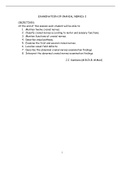
cranial nerves examination
The functions of the cranial nerves are sensory, motor, or both. Sensory cranial nerves help a person see, smell, and hear. Conversely, motor cranial nerves help control muscle movements in the head and neck. Each nerve has a name that reflects its function and a number according to its location in the brain. Scientists use Roman numerals from I to XII to label the cranial nerves in the brain. The 12 cranial nerves include the: olfactory nerve optic nerve oculomotor nerve trochlear n...
- Book
- Summary
- • 11 pages •
The functions of the cranial nerves are sensory, motor, or both. Sensory cranial nerves help a person see, smell, and hear. Conversely, motor cranial nerves help control muscle movements in the head and neck. Each nerve has a name that reflects its function and a number according to its location in the brain. Scientists use Roman numerals from I to XII to label the cranial nerves in the brain. The 12 cranial nerves include the: olfactory nerve optic nerve oculomotor nerve trochlear n...

Colorectal cancer
Colorectal cancer starts in the colon or the rectum. These cancers can also be called colon cancer or rectal cancer, depending on where they start. Colon cancer and rectal cancer are often grouped together because they have many features in common
- Book
- Summary
- • 59 pages •
Colorectal cancer starts in the colon or the rectum. These cancers can also be called colon cancer or rectal cancer, depending on where they start. Colon cancer and rectal cancer are often grouped together because they have many features in common
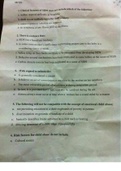
Forensic Medicine
Forensic medicine mainly deals with examination and assessment of individuals who have been—or are suspected to have been—injured or killed by external influence such as trauma or intoxication, but also of individuals who are suspected of having injured another person. This means that not only victims and suspects of crime, but also suicidees and accidental fatalities are examined by a specialist in forensic medicine (or forensic pathology)
- Book
- Exam (elaborations)
- • 8 pages •
Forensic medicine mainly deals with examination and assessment of individuals who have been—or are suspected to have been—injured or killed by external influence such as trauma or intoxication, but also of individuals who are suspected of having injured another person. This means that not only victims and suspects of crime, but also suicidees and accidental fatalities are examined by a specialist in forensic medicine (or forensic pathology)
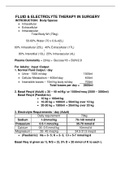
Fluid and electrolyte management
Proper management of fluid and electrolytes facilitates crucial homeostasis that allows cardiovascular perfusion, organ system function, and cellular mechanisms to respond to surgical illness. Knowledge of the compartmentalization of body fluids forms the basis for understanding pathologic shifts in these fluid spaces in disease states. Although difficult to quantify, a deficiency in the functional extracellular fluid compartment often requires resuscitation with isotonic fluids in surgical a...
- Book
- Summary
- • 7 pages •
Proper management of fluid and electrolytes facilitates crucial homeostasis that allows cardiovascular perfusion, organ system function, and cellular mechanisms to respond to surgical illness. Knowledge of the compartmentalization of body fluids forms the basis for understanding pathologic shifts in these fluid spaces in disease states. Although difficult to quantify, a deficiency in the functional extracellular fluid compartment often requires resuscitation with isotonic fluids in surgical a...

Acute Abdomen
Acute abdomen is a condition that demands urgent attention and treatment. The acute abdomen may be caused by an infection, inflammation, vascular occlusion, or obstruction. The patient will usually present with sudden onset of abdominal pain with associated nausea or vomiting. Most patients with an acute abdomen appear ill.
- Book
- Summary
- • 71 pages •
Acute abdomen is a condition that demands urgent attention and treatment. The acute abdomen may be caused by an infection, inflammation, vascular occlusion, or obstruction. The patient will usually present with sudden onset of abdominal pain with associated nausea or vomiting. Most patients with an acute abdomen appear ill.

Nephrotic syndrome
Nephrotic syndrome is a kidney disorder that causes your body to pass too much protein in your urine Is the combination of nephrotic-range proteinuria with a low serum albumin level and edema. Nephrotic-range proteinuria is the loss of 3 grams or more per day of protein into the urine or, on a single spot urine collection, the presence of 2 g of protein per gram of urine creatinine.
- Book
- Summary
- • 20 pages •
Nephrotic syndrome is a kidney disorder that causes your body to pass too much protein in your urine Is the combination of nephrotic-range proteinuria with a low serum albumin level and edema. Nephrotic-range proteinuria is the loss of 3 grams or more per day of protein into the urine or, on a single spot urine collection, the presence of 2 g of protein per gram of urine creatinine.

RENAL FAILURE
Kidney failure (also called renal failure) means one or both kidneys can no longer function well on their own. Kidney Failure : Symptoms and Causes Diagnosis and Tests Management and Treatment Prevention
- Book
- Summary
- • 29 pages •
Kidney failure (also called renal failure) means one or both kidneys can no longer function well on their own. Kidney Failure : Symptoms and Causes Diagnosis and Tests Management and Treatment Prevention
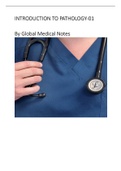
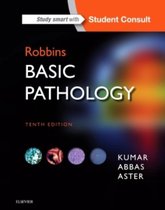
Introduction to Pathology
Summary introduction to pathology -Areas of study include cellular adaptation to injury, necrosis, inflammation, wound healing, and neoplasia
- Book
- Summary
- • 30 pages •
Summary introduction to pathology -Areas of study include cellular adaptation to injury, necrosis, inflammation, wound healing, and neoplasia
